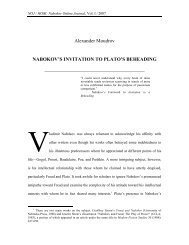domesticated translation: the case of nabokov's translation of alice's
domesticated translation: the case of nabokov's translation of alice's
domesticated translation: the case of nabokov's translation of alice's
You also want an ePaper? Increase the reach of your titles
YUMPU automatically turns print PDFs into web optimized ePapers that Google loves.
NOJ / НОЖ: Nabokov Online Journal, Vol. II / 2008<br />
commonly used in sub-standard English speech is translated as “baryshnia”, an old-<br />
fashioned way to refer to young women in Russia. The word expresses respect for <strong>the</strong><br />
lower-class, but in modern Russian it <strong>of</strong>ten has humorous connotations. On <strong>the</strong> whole,<br />
Nabokov succeeds in preserving <strong>the</strong> ironic, colloquial speech <strong>of</strong> <strong>the</strong> Gryphon by<br />
inventing Russian old-fashioned equivalents which echo a colloquial lower-class Russian<br />
speech. In this <strong>case</strong> his decision not to translate words literally seems correct because a<br />
word-for-word <strong>translation</strong> <strong>of</strong> “fun” and “young lady” into Russian would not adequately<br />
convey Carroll’s original intonations.<br />
An analogous example appears in <strong>the</strong> conversation between Alice and <strong>the</strong><br />
Duchess when <strong>the</strong> Duchess uses <strong>the</strong> expression “you dear old thing” addressing Alice.<br />
Stressing <strong>the</strong> ironic informality <strong>of</strong> <strong>the</strong> relationship between <strong>the</strong>m, Nabokov translates this<br />
expression as “detochka” (“baby”), a colloquial word used to address children that<br />
expresses an extreme familiarity when used to address adults.<br />
CONCLUSION<br />
It is difficult, if not impossible, to give an objective response to <strong>the</strong> question <strong>of</strong><br />
what constitutes a good <strong>translation</strong>. Nabokov’s decision to favor <strong>the</strong> almost complete<br />
Russification <strong>of</strong> Carroll’s novel is questionable, especially considering his later ideas<br />
about <strong>the</strong> importance <strong>of</strong> <strong>the</strong> <strong>translation</strong>’s exactness and accuracy. For instance,<br />
Nabokov’s <strong>translation</strong> <strong>of</strong> Eugene Onegin in prose, a perfect example <strong>of</strong> a foreignized<br />
<strong>translation</strong>: it aimed primarily at <strong>the</strong> scholarly audience and thus was equipped with<br />
scrupulous notes which explained not only <strong>the</strong> contextual and poetic meanings <strong>of</strong> <strong>the</strong>
















